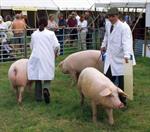
Private Practitioners
Private veterinarians may operate a general practice (dealing with most types of animals, and most types of problems), or a specialist service (dealing with only certain types of animals, or services such as artificial insemination or embryo transfer).
Traditionally, private vets are involved in diagnosing disease, and recommending treatment and/or control. In general, government departments only become involved when a serious contagious disease is suspected, when laboratory tests are needed, when public health may be threatened, or when a disease is unexplained & required detailed investigation.
Pathology Laboratories
Pathologists conduct scientific investigations into samples sent to them by a vet. These may be tissue samples, blood, etc. taken from a sick animal.
Quarantine Services
The federal government maintains strict restrictions upon the movement of animals that are, or may be sick. Any animals imported into Australia will normally need to be kept in quarantine for a period before being released. Any animals diagnosed with a serious designated disease will also be required to be isolated for a period.
University Veterinary Clinics
The main objectives of a university veterinary services are:
-
To provide training for undergraduate vet students; and specialist training to post graduates or practising vets.
-
To support and encourage profitability in associated industries (eg. farming, breeding, etc.), through research into animal health & production.
Vocational Colleges are also involved with training veterinary assistants and vet nurses, but rarely involved in research to the same degree that universities are.
Both Universities and Vocational colleges may (or may not) be involved in provision of some advisory or consultancy services; whether in a formal way (sick animals might be treated at the institution by students), or in an informal way (staff and/or students may be referred work from anyone inquiring with the institution.
Pharmaceutical Companies
Many pharmaceutical companies will employ veterinarians or others with some training in animal health care in roles such as:
Government Departments
Government often maintains its own veterinary service, with the following roles:
-
To protect domesticated animals from significant and contagious diseases.
-
To minimise health risks to the public which may arise from contaminated livestock products, or from disease in domesticated animals.
-
To control the sale of livestock & livestock products.
-
To encourage ethical animal welfare practices.
-
To control the impact of natural disasters (eg. drought & flood) on farm or other animals.
-
To provide extension (advisory) services to animal industries.
Scope of Veterinary Care
It is generally accepted that domesticated animals should be provided with proper veterinary care. When an animal is in a veterinary clinic or hospital, or under the care of a vet, this should involve the following:
-
Daily inspection and evaluation of the animals health and welfare.
-
Providing/ensuring appropriate care. (ie. This may involve accommodation, feeding, grooming etc).
-
Addressing any injuries or disease. (This may involve appropriate techniques of diagnosis, prevention, control and treatment).
-
Monitoring/delivering surgery and post surgical services.
-
Proper use and/or handling. This may involve advising owners, and/or ensuring veterinary staff use appropriate measures for handling, immobilising, anaesthetising, administering pharmaceuticals, or euthanasia.
Pathways to Becoming a Vet
Animal health care is a good place to begin. After that I would suggest you both continue with further studies, and at the same time start to build some experience (whether paid or voluntary work).
A Certificate or Advanced Certificate is of course going to be better than a single module like "Animal Health Care". The more you study, the more attractive you are to employers and the easier it is to get into university and perhaps get credits in a veterinary science degree, if that turns out to be your eventual path.
A vet science degree is needed if you want to practice as a vet; but that is a huge commitment, and perhaps better considered as a long term goal.
There are plenty of career paths for working with animals that are not as involved as that, so perhaps take small steps, and make decisions about the next step at each stage as you move along